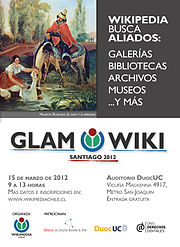GLAM/Newsletter/March 2012/Contents/Chile report
|
First Latin American GLAM-WIKI conference hosted in Santiago




Wikimedia Chile, the local chapter of the Wikimedia Foundation, hosted on March 15th the first GLAM-WIKI conference in Latin America. The event took place on the San Joaquín Auditorium of the Duoc UC Institute in the Chilean capital, Santiago.
More than 80 people attended to the event, including several representatives from cultural and academic institutions of the country. People from institutions like the National Library and Archive of Chile, the Council of National Monuments, the Museum of the Memory and Human Rights, the Archives of the University of Chile and the Pontifical Catholic University took part of the conference.
The event was opened by Osmar Valdebenito, president of Wikimedia Chile, explaining to the audience what Wikipedia and the Wikimedia Movement means and why it is important for the institutions to engage with its volunteers. "Our cultural heritage belongs to our people, and we want to feel part of it" explained Mr. Valdebenito, before introducing to some of the most known GLAM agreements in the past years around the world. Cultural institutions "should leave their prejuices behind and take a chance", finished Mr. Valdebenito.
Roxana Donoso presented her experience leading the engagement of the Library of the National Congress with Wikimedia projects. Several projects have been developed by the Library of the National Congress since 2009, especially on Wikisource. The two main projects, the Enciclopedia Chilena and Hansards of the Legislative Bodies between 1810 and 1845 have uploaded more than 20,000 pages to the Spanish Wikisource, increasing several times the number of proofread and validated pages. She highlighted how the participation of volunteers can help a cultural institutions to innovate, to improve their work and to promote their mission.
After Mrs. Donoso's presentation, Sarah Stierch and Ryan Kaldari presented different GLAM experiences, mainly in the US. Experiences at the National Archives or the Children's Museum of Indianapolis were explained to the audience. A video of Wiki loves arts was presented and also other activities that will take part in Chile this year, like Wiki Loves Monuments.
At the end, a discussion panel was hosted. It included Melanie Dulong de Rosnay (Creative Commons France), Beatriz Busaniche (Wikimedia Argentina), Claudio Ruiz (Derechos Digitales and Creative Commons Chile) and Roxana Donoso (Library of the National Congress). Although all of them agreed in the main reasons why a cultural institution should participate at Wikimedia projects, there were interesting differences in the main difficulties to overcome before make that kind of agreements. While Mrs. Busaniche explained that there were a lot of problems because of lawyers and other museum authorities trying to keep their contents for commercial or other restrictive purposes, while Mr. Ruiz explained that one of the main problems is the law itself. Although the new law about intellectual property solved a lot of problems, it doesn't address all of them. One of those cases is the problem of orphan works, especially those created at the middle of the XX century, where it is not clear if they are on the public domain or still under copyright protection. Also, Ruiz addressed the problem of public domain works that have been released with copyright notice, with the main example of Memoria Chilena (website of the National Library), and hoped that it could be solved soon.
The event was highly successful and had a lot of appearences at the Chilean press, including La Segunda newspapers and popular websites like Radio Biobío and Terra.
Documentation
- GLAM-Wiki, ¿en qué estamos?, Osmar Valdebenito (in Spanish).
- Experiencia de la Biblioteca del Congreso Nacional, Roxana Donoso (in Spanish).
- Join the GLAM-WIKI revolution, Sarah Stierch and Ryan Kaldari.
More images are available at Wikimedia Commons.


